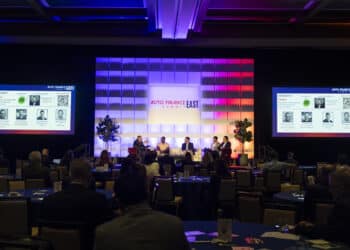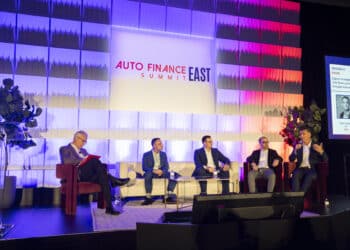The wolf among us: Fraud in auto finance
From the October issue:
In the past year, Auto Finance News has tracked 20 cases of auto loan fraud in the United States alone. The schemes racked up more than $173 million in fake loans and stolen cars.
But these data points only tell part of the story.
Auto fraud is notoriously hard to catch, said Detective Alex Arenas, head of economic crimes at the Fort Lauderdale Police Department. In fact, less than 2% of fraud schemes are typically uncovered by law enforcement. Lenders, to be sure, have long been taking steps to curb fraudulent activity.
“We catch around $4 million to $5 million of fraudulent originations per month,” said Westlake Financial Services Treasury Director Franka Bicolli. “When we are booking a deal, if we see an alert from the fraud tools we have, it directly alerts one of our credit analysts.” Westlake has caught roughly $50 million in fraudulent applications in the past year, she added. Industrywide, risk of auto loan origination fraud is forecast to hit $7 billion by year end, a 5% increase year over year, according to data shared with AFN by PointPredictive’s Chief Fraud Strategist Frank McKenna.
McKenna’s analysis was conducted on more than 70 million historical auto loan applications. The potential reach of auto finance fraud demands that lenders stay one step ahead. “Fraud has been around in this space for years,” said Amy Martin, director of structured finance at S&P Global Ratings.
“I’ve been [in the industry] since 1993, and it’s been a risk in this space. Auto finance companies have to continue to innovate in new ways to identify fraud, because the fraud is changing,” she noted. Of the cases that have gone to judgment — meaning that restitution has been paid or ordered to be paid to victimized lenders — credit unions have been targeted most often, according to AFN’s analysis. Specifically, Navy Federal Credit Union and Pentagon Federal Credit Union suffered the greatest fraud-related losses. In total, 31 credit unions were victimized by auto loan scams.
Meanwhile, Ally Financial, AmeriCredit, Capital One Auto Finance, PNC Bank, Santander Consumer USA, USAA Bank and captives Ford Motor Credit, Hyundai Capital America and Nissan Motor Acceptance Corp. were also nailed by fraud in the past 12 months.
Ford Motor Credit dubbed its case against the Reagor-Dykes Auto Group “one of the largest floorplan financing frauds in the history of the U.S.,” according to court documents. Ford Credit claimed it was owed $112 million from the Lubbock, Texas-based dealership chain. The case has been ongoing for more than a year.
Independent financiers Exeter Finance, Global Lending Services and Skopos Financial were also victims of auto fraud in the past year. Half of the cases were perpetrated by dealers, establishing dealer fraud as the most common type of fraud found in AFN’s investigation. Strawbuying fraud — in which the purchase and financing of vehicles are done using someone else’s credit — was the second-most common type of fraud, committed 25% of the time.
Yet, across the board, every source AFN spoke with agreed that auto loan fraud involves some aspect of a misrepresented identity. In order to stop fraud, lenders must first understand the different forms it can take.
The many faces of fraud
Synthetic identity fraud is the process of misrepresenting — in whole or in part — one’s identity through the use of fake Social Security Numbers, or through false addresses, employment histories or income. It is the most rampant form of fraud because it is involved in every dealership or consumer deception.
In fact, synthetic fraud balances reached nearly $2 billion through midyear, according to data from TransUnion. Auto loan fraud perpetrated using synthetic identities accounted for 62% of the total balance.
“Synthetic identity theft is the largest fraud we are seeing in the industry right now,” said Todd Wolf, chairman of the Auto Finance Coalition (AFC). The AFC, which was founded in 2011 and consists of 165 members, is dedicated to snuffing out fraud rings in the auto finance industry. The coalition documents its findings in white papers it submits to the auto finance community, federal regulators and law enforcement agencies. The AFC has assisted in cases involving tens of millions of dollars, Wolf noted.
In one instance, Jackson, Miss.-based Magnolia Federal Credit Union was the target of a seven-person synthetic fraud ring in which the conspirators used fake Social Security numbers and
fraudulent employment history to apply for loans for vehicles at nonexistent car dealerships. The scam even went so far as to have one perpetrator man a phone line used for the sole purpose of verifying the false employment records.
Fraudsters will also recruit other individuals to help them defraud auto lenders in a process known as straw-buying. By itself, straw buying isn’t illegal, but paired with tactics of synthetic fraud, it is largely successful in fooling lenders.
Straw buyers in North Carolina recruited at least 30 individuals and defrauded 15 credit unions out of $1 million worth of direct auto loans. The trio created fake purchase orders that were submitted with loan applications — and established bank accounts and false websites and physical addresses to corroborate the validity of the fake dealerships. Most of those loans
defaulted, and when the credit unions attempted to collect on the debts, the fraudsters attempted to convince the financial institutions that the borrowers were victims of identity theft.
Meanwhile, in Ohio, two men defrauded nine financial institutions — including USAA, PenFed, and Navy Federal — to the tune of $2.7 million between August 2014 and April 2018. The pair recruited eligible credit union members to submit multiple loan applications on a single vehicle without any intention of transferring the vehicle’s ownership.
California was home to the largest — and costliest — straw-buying fraud conspiracy, AFN found. The organized ring, comprised of 21 members, racked up $5 million in fraudulent auto loans on more than 100 vehicles. The perpetrators formed 54 shell companies and opened 45 bank accounts with various financiers to facilitate the fraud, according to the San Diego Regional Auto Theft Task Force.
In some cases, auto dealers can serve as the first line of defense against synthetic and straw-buying fraud, Arenas said. “I got into [auto fraud] when the finance manager at a [Fort Lauderdale, Fla.-area] Yamaha dealership reached out to me — he was good at pointing out when something wasn’t smelling right with a customer,” Arenas said, noting that nine times out of ten, if a person shows up and buys a new WaveRunner after rolling up in a brand new vehicle, he is more than likely [committing] fraud with synthetic identity.
“A two-second check of the Social Security Number and driver’s license would tell me if they matched,” Arenas said, noting that auto loan fraud can be stopped at the dealership level. “The finance company and dealer need to work closely together,” he added.
But what happens when the dealer is the one perpetrating the fraud?
Et tu, Brute?
Captives and their dealers strive to work as partners, yet Ford Credit, NMAC and HCA — whose portfolios range from $29.8 billion to $78.9 billion — have all been victims of dealer fraud.
Altogether, the captives’ fraud losses in the past year totaled roughly $124.4 million.
The most common type of dealer fraud relates to floorplans and may occur in several ways. In the case of Ford Credit, dealership chain Reagor-Dykes “double floored” 185 vehicles, meaning that one Reagor-Dykes dealership obtained financing for a vehicle, then the same vehicle was transferred to another Reagor-Dykes dealership and financing was secured.
According to court documents, Ford Credit claimed the dealer group allegedly sold more than 1,100 vehicles without making payments on its floorplan loan, also known as selling vehicles “out of trust.”
HCA and NMAC have also been exposed to this type of fraud. In one instance, HCA and NMAC accused a dealer group with operations across Pennsylvania and Michigan of failing to repay floorplan loans and selling $10.5 million worth of vehicles out of trust.
Dealer fraud has surfaced in several lawsuits in the past year, said Josh Wortman, a data analyst with General Forensics. “The focus on fraud is actually wrong,” he said. “Fraud is too narrowly defined and too hard to pin down. By the time you accuse a dealer of fraud it is too late, the damage has been done. The more useful, smart approach is to focus on spotting early indicators of suspicious behavior.”
Suspicious behavior can be difficult to identify, especially when dealers will leverage their employment to fool customers. For example, last month a former dealer for Pompano Beach, Fla.-based Champion Porsche pled guilty to a fraud scheme that racked up $3 million. To facilitate the scheme, the fraudster sold non-existent exotic Porsche models and leveraged a fake title as “vice president of marketing” of Champion Porsche to ramp up his credibility.
Spotting a fraudster is even more challenging when it is perpetrated by someone the industry would never suspect. Andrew Gabler, the former president of the National Independent Automobile Dealers Association and owner of two Erie County, Pa.-based dealerships — Lakeside Auto and Lakeside Chevrolet — was indicted in August on 17 counts of auto fraud. Gabler allegedly inflated borrowers’ incomes on loan applications and falsely claimed that down payments were made. He also falsely reported vehicle sales to General Motors in order to claim soon-to-expire rebates offered by the OEM. When vehicles were sold, Gabler failed to make payments on his floorplan loan provided by Indiana, Pa.-based S&T Bank.
Whether a captive financier, bank, or credit union, every company has been exposed to the wolf in sheep’s clothing. Altogether, AFN found dealer fraud reached $126.4 million in the past year.
Filling the gap
Law enforcement can’t stop fraud without lenders’ help, said Matthew Pannell, a former special agent with the Internal Revenue Service Criminal Investigation Unit and the Social Security Administration Office of the Inspector General. In his 30-years experience investigating fraud, Pannell has seen lenders leverage internal data to cover the ground where law enforcement falls short because they are limited by the letter of the law.
“[As a special agent], I can’t view the lenders’ records without a subpoena,” Pannell said. “When I would visit with [various lenders], they would be able to identify big [fraud] rings using synthetics through link analysis software. They had access to records that I didn’t have,” he said, adding that it’s a “daunting task” for law enforcement to identify and link synthetic fraud cases together.
“Most federal agencies rely on a victim — or a bank that is being victimized or suspects something suspicious is going on — to alert law enforcement,” Pannell said. “In a way, [synthetic fraud] is a victimless crime because there’s no one saying their identity has been stolen, but obviously it’s harming the lending institutions,” he said, noting that lenders don’t usually report the fraud because the loan has already been originated and it gets passed on to collections or categorized as uncollectible.
“If [lenders] are going to get federal agencies involved in [stopping fraud], they’ve got to link the cases,” Pannell said. “If you cut off the head of one, another grows back.”
Practically, lenders should review listed employers and addresses to link together fraudulent credit applications, Pannell said. “Find out what’s common amongst other applications and that one application — whether it’s the employer or address,” he said. In addition, “the size and dollar amount of the fraud are critical when the case is being evaluated by law enforcement,” he added.
Arenas echoed this sentiment, bringing dealers into the mix. “We can only identify synthetic fraud if dealers call us — there is no way for me to go out there and catch it,” he said. “I’ve always wanted to walk into a dealership and say, ‘Give me 100 of your files and let me go through them.’ But do you think a dealership wants to know if they [are victims of fraud]? No, they’d rather turn a blind eye.”
“We have to get calls from dealerships” Arenas added. “We used to get one or two calls a week [from the Yamaha dealership]. Then, the finance manager moved to Miami and we stopped getting calls — not because the fraud stopped, but because the manager who was catching them left.” Similarly, “if the [lenders] analyzed the loan deals that fall off after the first three months, I guarantee they’d find a boatload of fraud,” Arenas noted.
Four eyes on the problem
As fraud is revealed today more than ever before, lenders need to have a “toolbox” to proactively stop it, AFC’s Wolf said. Lenders must leverage technology tools — like machine learning — to catch fraudsters, but the best way to catch fraud is with the human eye.
Auto lenders will use software to detect fraud but have a difficult time catching it because the data lenders are looking at is compromised, Pannell said. “They typically rely on the credit bureau to verify or validate an SSN,” he said, noting the data is compromised because it’s a fake credit profile and the credit bureaus don’t know that.
“Machine learning is a great tool,” Wolf said. “But the best way to combat fraud is with four eyes — you have to physically identify it — from the dealership to the finance company.”
“Let’s start with the dealer,” Wolf continued. “When your customer comes in, the dealer needs to do their due diligence.” There are plenty of red flags out there, like a potential customer that keeps looking down at their ID to share information that should be readily known, like an address or ZIP code.
On the other hand, dealers and lenders need to beware of the overly “bonafide customer” or a customer that comes into a dealership and is inordinately prepared to prove they are real, Wolf said. “The internet is our friend,” he added. “Check to see if a borrower’s employer even exists, use Google Maps to see if their address is real.”
In fact, every dealership and finance company should leverage the I.D. Checking Guide, which is published and updated every year. The guide consists of every valid driver’s license across the U.S. and Canada.
However, one of the “most important pieces of evidence” are customers’ inquiries, Wolf said. “If you run someone’s credit and you see they have different inquiries from a bunch of different financial institutions — that’s an obvious red flag.”
Now, not all red flags are fraud, but the point is that the auto finance industry needs to stop and reevaluate what information a consumer hands over, work with credit analysts and underwriters, and feel empowered enough to say, “We won’t fund this deal,” Wolf said.
In addition, communication among industry players is vital to catching fraud. “Finance companies need to talk to each other,” Wolf said. “Call up your fellow lender and ask, ‘Did you guys sign this person up for a contract the other day?’”
“It’s about that collaboration, communication and cooperation,” Wolf urged. “We have to get that out there. It’s simple, yet overlooked. [Lenders] don’t need a lot of resources to combat fraud. Slow down and look for it.”
Yet there is a disconnect between dealers and finance companies, Arenas said. “Finance managers need to have more power to say, ‘I’m not funding this deal’ or ‘I’m not selling you this car because of these red flags,’” he explained. “A lot of dealers are afraid of being sued for discrimination. But if your employees at a dealership or finance company can articulate why they are not funding a deal, it’s fine.”
Dealers, too, may feel pressure to meet lender quotas, which, in turn, puts the onus on lenders to foster a culture of fraud prevention, Wolf said. To that end, the industry has to become comfortable about communicating with each other about fraud, said Zahid Kassem, fraud expert and former enterprise fraud executive at a large subprime lender. “We’ve got to get lenders to share information for fraud mitigation,” he said, noting that once auto financiers reach a common ground for sharing data, the industry will have a real shot at combating fraud.







